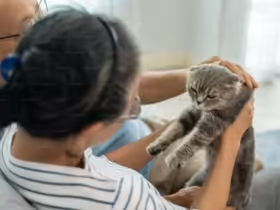How to Tell If Your Cat Has Herpes: Symptoms, Diagnosis, and Treatment
Feline herpesvirus (FHV-1) is a common virus that affects cats, causing a range of respiratory and ocular symptoms. It’s important for cat owners to recognize the signs of feline herpes to ensure timely treatment and management. This comprehensive guide will help you understand how to identify if your cat has herpes, including its symptoms, diagnosis, treatment options, and preventative measures.
Understanding Feline Herpesvirus (FHV-1)
Feline herpesvirus is a type of virus that primarily affects the respiratory and ocular systems in cats. It is highly contagious and can spread through direct contact with an infected cat or contaminated objects. The virus can cause acute symptoms during an initial infection and may remain dormant in the cat’s body, potentially causing flare-ups later in life.
Symptoms of Feline Herpesvirus
1. Respiratory Symptoms
- Sneezing: Frequent sneezing is a common sign of feline herpes.
- Nasal Discharge: Your cat may have a runny nose with clear or colored discharge.
- Coughing: Some cats may develop a cough or show signs of respiratory distress.
2. Ocular Symptoms
- Conjunctivitis: Inflammation of the eye lining, causing redness, swelling, and discharge.
- Corneal Ulcers: Sores on the cornea of the eye that can lead to squinting or excessive tearing.
- Watery Eyes: Excessive tearing or clear discharge from the eyes.
3. General Symptoms
- Loss of Appetite: Your cat may eat less or refuse food due to discomfort or a reduced sense of smell.
- Lethargy: Affected cats may appear more tired or less active than usual.
- Fever: A mild fever may accompany the infection, making your cat feel unwell.
4. Secondary Infections
- Secondary Bacterial Infections: The herpesvirus can weaken the immune system, making cats more susceptible to secondary bacterial infections.
Diagnosing Feline Herpesvirus
1. Veterinary Examination
- Physical Exam: A thorough examination by a veterinarian will help identify signs of herpesvirus infection and rule out other conditions.
- Symptom Assessment: Your vet will assess the symptoms your cat is experiencing, such as nasal discharge, eye problems, and overall health.
2. Diagnostic Tests
- PCR Test: Polymerase chain reaction (PCR) testing can detect the presence of herpesvirus DNA in nasal or ocular swabs.
- Serology: Blood tests can help identify antibodies to the herpesvirus, indicating exposure to the virus.
- Corneal Scraping: If corneal ulcers are present, a corneal scraping may be examined to check for viral infection.
Treatment Options for Feline Herpesvirus
1. Medications
- Antiviral Medications: Prescription antiviral drugs like famciclovir may be recommended to reduce the severity and duration of symptoms.
- Antibiotics: If secondary bacterial infections are present, antibiotics may be prescribed.
- Topical Ocular Treatments: Eye drops or ointments may be used to treat conjunctivitis and corneal ulcers.
2. Supportive Care
- Hydration and Nutrition: Ensure your cat stays hydrated and eats well. Warm, soft food may be more appealing if your cat has a reduced sense of smell or is feeling unwell.
- Humidifiers: Using a humidifier can help relieve nasal congestion and ease respiratory symptoms.
- Nasal and Eye Care: Gently clean your cat’s nasal discharge and eye discharge with a damp cloth to prevent crusting and irritation.
3. Managing Flare-Ups
- Stress Reduction: Reducing stress and maintaining a calm environment can help minimize flare-ups of the herpesvirus.
- Maintaining Health: Keeping your cat’s immune system strong through a balanced diet and regular veterinary care can help manage the virus.
Preventing Feline Herpesvirus
1. Vaccination
- FVRCP Vaccine: The FVRCP vaccine, which includes protection against feline herpesvirus, is crucial for preventing infection. Ensure your cat is up-to-date with vaccinations, especially if they are at higher risk or frequently exposed to other cats.
2. Hygiene and Environment
- Clean Living Areas: Regularly clean your cat’s living space, including bedding and toys, to minimize the risk of spreading the virus.
- Avoid Sharing Items: Avoid sharing food bowls, litter boxes, and other items with infected cats to prevent transmission.
3. Isolate Infected Cats
- Quarantine: If a cat in your household has feline herpesvirus, isolate them from other cats to prevent spreading the virus. Follow your veterinarian’s advice on isolation and care.
4. Regular Veterinary Check-Ups
- Health Monitoring: Regular check-ups with your veterinarian will help monitor your cat’s overall health and catch any potential issues early.
Living with a Cat with Feline Herpesvirus
1. Managing Chronic Symptoms
- Long-Term Care: Some cats may experience chronic symptoms or recurring flare-ups. Regular veterinary visits and ongoing management strategies can help keep these issues under control.
2. Quality of Life
- Comfort and Care: Ensure your cat is comfortable and receives proper care to manage symptoms and improve their quality of life.
3. Support for Multi-Cat Households
- Monitor All Cats: In households with multiple cats, monitor all animals for symptoms of feline herpesvirus and ensure they are vaccinated and healthy.











Leave a Reply